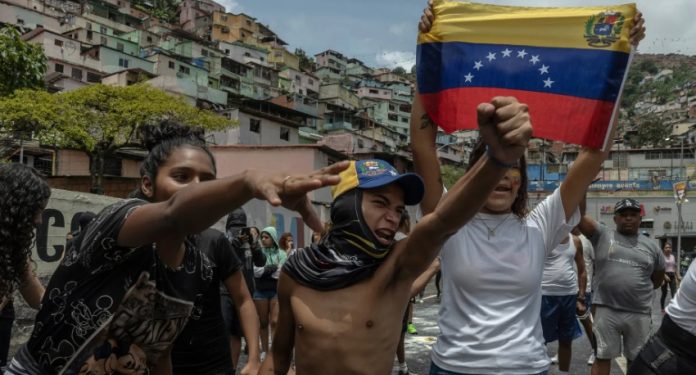Demonstrations are taking place in the Venezuelan capital Caracas, where protesters are opposing the official results of the presidential election. A column of protesters near the Miraflores presidential palace was blocked by police and national guards and tear gas was fired against the protesters, Venezuelan media reported.
Thousands of people crowded the streets of several neighbourhoods in the capital on Monday, chanting “Freedom, freedom!” and “This government will fall!”
Some tore Maduro campaign posters off street poles and burned them.
Across the country, protesters toppled at least two statues of Hugo Chavez, the late socialist who led the country for more than a decade and chose Maduro as his successor.
At least one person was killed in the unrest in Venezuela, AFP reported, citing human rights activists. Another 46 were detained, they said. Defence Minister Vladimir Padrino Lopez wrote on social network X that 23 soldiers were wounded, some of them by gunfire. He did not give the number of casualties on the part of the protesters.
AFP watched as national guard officers fired tear gas and rubber bullets at demonstrators, some wearing motorbike helmets and bandanas tied around their faces for protection in Caracas. Some threw stones in response.
Protests were reported even in very poor neighbourhoods of Caracas, which have been bastions of support for Maduro and his socialist government. Gunshots were heard in some neighbourhoods. Protests broke out in other parts of Venezuela as well.
Public and political reaction to the election results
Venezuela’s elections were held on July 28, with Nicolas Maduro winning with 51.2% of the vote. Speaking to supporters outside the presidential palace, Maduro said his victory was a “triumph of peace and stability” and it shows that Venezuela’s electoral system is “transparent.”
At the same time, Argentine President Javier Milei stressed that he would not recognise the victory of the incumbent Venezuelan leader. At the same time, the Bolivarian Republic’s Foreign Minister, Yván Gil, spoke of an attempt to interfere in the elections by “another version of the infamous, defunct and defeated Lima Group,” an organisation formed against Maduro’s rule.
Marco Tarquinio, Italian journalist and former editor of Avvenire, wrote on X:
“Voting in #Venezuela. As in other cases, and not only in the South American context, the wisest instruction comes from Brazilian leader Lula: let the votes be recounted and the UN and the Carter Centre will follow up, which has already been accepted by all sides. We don’t need to cheer for Maduro or Gonzalez, we need clarity.”
